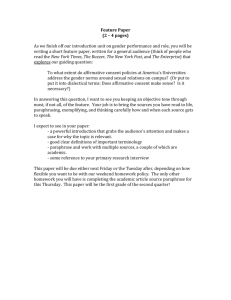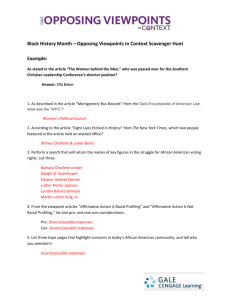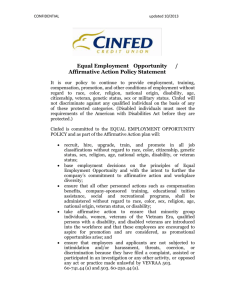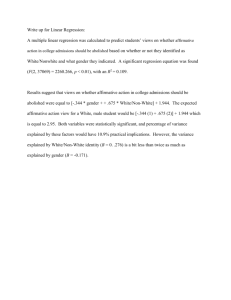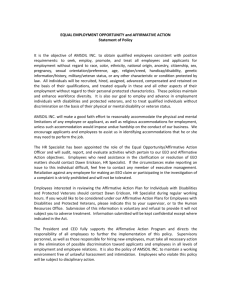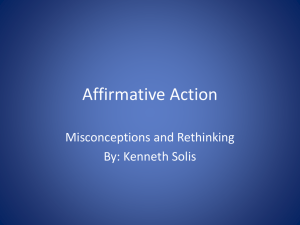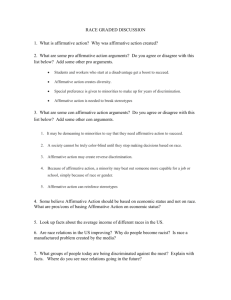WHO SUPPORTS AFFIRMATIVE ACTION?
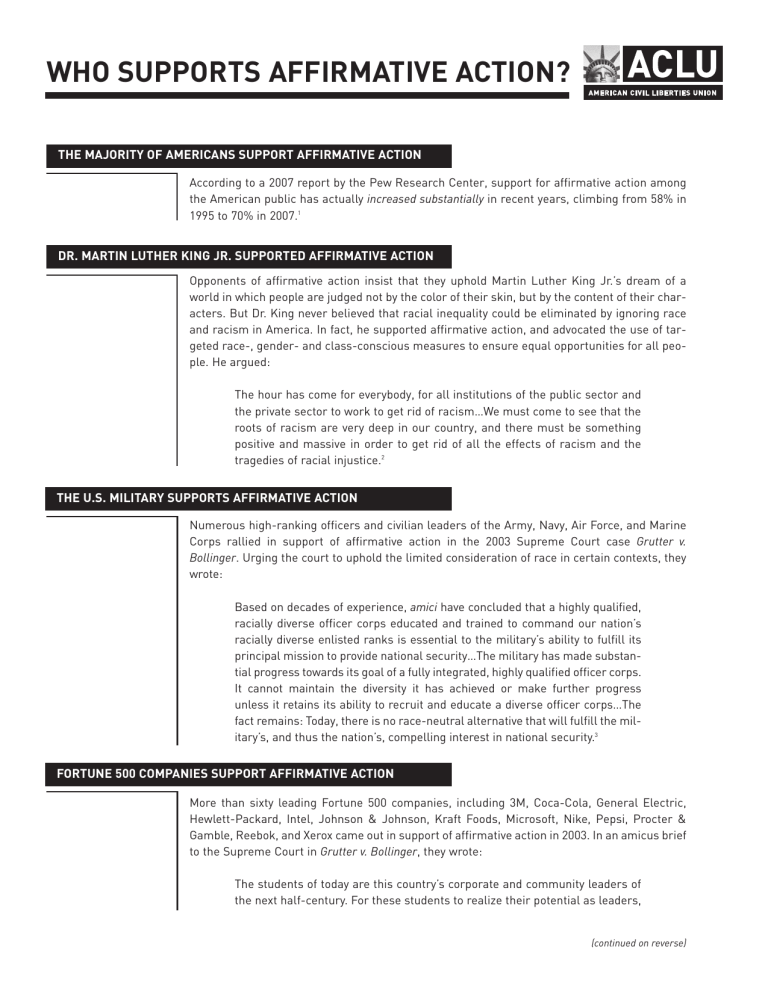
WHO SUPPORTS AFFIRMATIVE ACTION?
THE MAJORITY OF AMERICANS SUPPORT AFFIRMATIVE ACTION
According to a 2007 report by the Pew Research Center, support for affirmative action among the American public has actually increased substantially in recent years, climbing from 58% in
1995 to 70% in 2007.
1
DR. MARTIN LUTHER KING JR. SUPPORTED AFFIRMATIVE ACTION
Opponents of affirmative action insist that they uphold Martin Luther King Jr.’s dream of a world in which people are judged not by the color of their skin, but by the content of their characters. But Dr. King never believed that racial inequality could be eliminated by ignoring race and racism in America. In fact, he supported affirmative action, and advocated the use of targeted race-, gender- and class-conscious measures to ensure equal opportunities for all people. He argued:
The hour has come for everybody, for all institutions of the public sector and the private sector to work to get rid of racism…We must come to see that the roots of racism are very deep in our country, and there must be something positive and massive in order to get rid of all the effects of racism and the tragedies of racial injustice.
2
THE U.S. MILITARY SUPPORTS AFFIRMATIVE ACTION
Numerous high-ranking officers and civilian leaders of the Army, Navy, Air Force, and Marine
Corps rallied in support of affirmative action in the 2003 Supreme Court case Grutter v.
Bollinger . Urging the court to uphold the limited consideration of race in certain contexts, they wrote:
Based on decades of experience, amici have concluded that a highly qualified, racially diverse officer corps educated and trained to command our nation’s racially diverse enlisted ranks is essential to the military’s ability to fulfill its principal mission to provide national security…The military has made substantial progress towards its goal of a fully integrated, highly qualified officer corps.
It cannot maintain the diversity it has achieved or make further progress unless it retains its ability to recruit and educate a diverse officer corps…The fact remains: Today, there is no race-neutral alternative that will fulfill the military’s, and thus the nation’s, compelling interest in national security.
3
FORTUNE 500 COMPANIES SUPPORT AFFIRMATIVE ACTION
More than sixty leading Fortune 500 companies, including 3M, Coca-Cola, General Electric,
Hewlett-Packard, Intel, Johnson & Johnson, Kraft Foods, Microsoft, Nike, Pepsi, Procter &
Gamble, Reebok, and Xerox came out in support of affirmative action in 2003. In an amicus brief to the Supreme Court in Grutter v. Bollinger , they wrote:
The students of today are this country’s corporate and community leaders of the next half-century. For these students to realize their potential as leaders,
(continued on reverse)
it is essential that they be educated in an environment where they are exposed to diverse people, ideas, perspectives and interactions. In the experience of the amici businesses, today’s global marketplace and the increasing diversity in the American population demand the cross-cultural experience and understanding gained from such an education.
4
AMERICA’S TOP UNIVERSITIES SUPPORT AFFIRMATIVE ACTION
Harvard University, Brown University, the University of Chicago, Dartmouth College, Duke
University, the University of Pennsylvania, Princeton University, and Yale University joined together in 2003 to voice their support for the continued use of race-conscious admissions programs. They wrote:
Academically selective universities have a compelling interest in ensuring that their student bodies incorporate the experiences and talents of the wide spectrum of racial and ethnic groups that make up our society. Amici should be free to compose a class that brings together many different kinds of students; that includes robust representation of students from different races and ethnicities; and that prepares graduates to work successfully in a diverse nation. Indeed, highly selective universities have long defined as one of their central missions the training of the nation’s business, government, academic, and professional leaders. By creating a broadly diverse class, amici’s admissions policies help to assure that their graduates are well prepared to succeed in an increasingly complex and multi-racial society.
5
PROMINENT SPORTS FIGURES SUPPORT AFFIRMATIVE ACTION
In 2006, the National Association of Basketball Coaches (NABC), the Women's Basketball
Coaches Association and the Black Coaches Association passed resolutions opposing
Proposition 2, the ballot initiative that ultimately ended affirmative action in Michigan. Many of
Michigan’s most well-respected college basketball coaches spoke out about the importance of preserving affirmative action and promoting equality of opportunity for all students, including
Tom Izzo (Michigan State University), Joanne P. McCallie (Michigan State University), Tommy
Amaker (University of Michigan) and Ernie Zeigler (Central Michigan University).
6
In 2008, the NABC again came out in favor of preserving affirmative action and against initiatives to eliminate it, stating in a press release:
The Board of Directors of the National Association of Basketball Coaches recognizes the importance of affirmative action programs in expanding opportunities for underrepresented minorities and women in university admissions and employment. Therefore, the NABC Board of Directors opposes the deceptively-titled “Civil Rights Initiatives” currently being proposed in Arizona,
Colorado and Nebraska that would, if enacted, threaten access programs in those states.
7
1 The Pew Research Center for the People & the Press, “Trends in Political Values and Core Attitudes: 1987-2007.” March 22, 2007.
2 Dr. Martin Luther King, Jr., “Remaining Awake Through a Great Revolution.” Delivered at the National Cathedral, Washington, D.C., March 31, 1968.
3 Consolidated Brief of Lt. Gen. Julius W. Becton, Jr. et al. as
Amici Curiae in Grutter v. Bollinger , United States Supreme Court, 2003.
4 Brief for
Amici Curiae : 65 Leading American Businesses in Grutter v. Bollinger , United States Supreme Court, 2003.
5 Brief of Harvard University et al. as
Amici Curiae in Grutter v. Bollinger , United States Supreme Court, 2003.
6 See http://www.youtube.com/user/OneUnitedMichigan for video clips.
7 National Association of Basketball Coaches, “NABC Board of Directors Opposes ‘Civil Rights Initiatives’ Proposed in Arizona, Colorado and Nebraska”
[press release], June 26, 2008.
